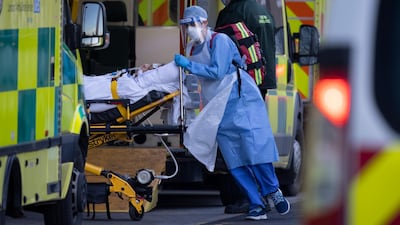London has declared a “major incident” over the “out of control” spread of coronavirus.
The declaration came as the UK recorded its largest-ever daily increase in Covid-related deaths since the pandemic began.
A further 1,325 deaths were reported in the previous 24 hours as well as a record 68,053 new cases. The previous death toll record was on April 21 when 1,224 fatalities were reported.
In the capital, the coronavirus infection rate is currently more than 1,000 per 100,000.
Major incidents have previously been declared in the wake of the Grenfell Tower fire in 2017 and the terrorist attacks at Westminster and London Bridge.
A major incident is defined as a situation “beyond the scope of business-as-usual operations" and requires a multi-agency response.
London mayor Sadiq Khan said the National Health Service was at risk of becoming overwhelmed, with more than 7,000 coronavirus patients currently in London hospitals.
He said there was about a 30 per cent surge in the number of people in hospitals in the city in the seven days between December 30 and January 6.
The London Ambulance Service is taking up to 8,000 emergency calls a day, compared with 5,500 on a typical busy day, the mayor said.
“The situation in London is now critical with the spread of the virus out of control,” Mr Khan said.
“The number of cases in London has increased rapidly with more than a third more patients being treated in our hospitals now compared to the peak of the pandemic last April.”
Mr Khan has written to Prime Minister Boris Johnson asking for more financial support for London residents who need to self-isolate and are unable to work.
He is also asking for the closure of places of worship and for face masks to be worn routinely outside of the home, including in crowded places and supermarket queues.
Georgia Gould, Chair of London Councils, said: “Cases are rising at a dangerous rate in London, putting extreme pressure on the NHS.
“One in 30 Londoners now has Covid. This is why public services across London are urging all Londoners to please stay at home except for absolutely essential shopping and exercise."
A major study released on Friday suggested Covid-19 infections rose by nearly a third between December 26 and January 3.
The R or reproduction number - the average number of people a person with the virus goes on to infect - is now between 1 and 1.4 for the UK.
The ZOE Covid Symptom Study found that coronavirus infections may have reached 70,000 new cases a day over Christmas.
Surging hospital admissions have prompted authorities to reopen the Nightingale field hospital at the ExCeL Centre in London amid fears the capital is on the brink of running out of intensive care beds.
The government has said the health service is in a race against time to inoculate as many people as possible, with a third Covid-19 vaccine approved on Friday.
However, scientists warned the vaccination could confuse people into believing they no longer had to follow social-distancing rules.
A survey found more than a quarter of people (29 per cent) planned to adhere less strictly to coronavirus restrictions once they have received a vaccine, according to the Scientific Pandemic Influenza Group on Behaviours.

